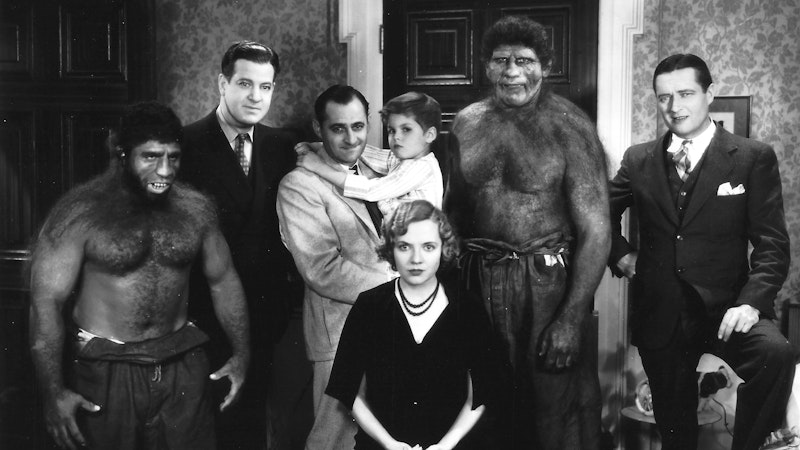The image of a mad scientist is a significant part of both literary and cinematic tradition. The scientist pushes boundaries in an attempt to achieve greatness, but this greatness almost always includes human sacrifice in some manner. Erle C. Kenton’s film, Island of Lost Souls (1932) is an adaptation of H. G. Wells’ 1896 novel, The Island of Dr. Moreau, and features Charles Laughton as the evil Dr. Moreau; Richard Arlen as Edward Parker, who gets stranded on Moreau’s island of evil; Leila Hyams as Ruth Thomas, Parker’s fiancé in desperate search for Parker; Arthur Hohl as Montgomery, Moreau’s reluctant assistant; Kathleen Burke as Lota, a panther turned woman; and Bela Lugosi, as the half man, half beast and the Sayer of the Law.
It’s an impressive cast, and Laughton dominates the screen, not only because of his impeccable acting talent but also Moreau’s character. (Although, it’s impossible to ignore Lugosi’s presence in the film despite the heavy, werewolf-like make-up he’s wearing. Lugosi’s voice and eyes are unmistakable).
After Parker gets rescued by a passing ship, he encounters cages of strange creatures bound for Moreau’s island. What happens on the island is the subject of both reality and mythology, and as Parker is about to find out, every tale of horror turns out to be true. The ship’s drunk and lazy captain kicks Parker off the ship and he finds himself as a guest of Dr. Moreau.
At first, Moreau is welcoming, kind of like a Bond villain who insists on showing his archenemy a good time before disposing of him. But there’s something boiling underneath this strange kindness. Moreau is very civilized in an uncivilized jungle, or at least, that’s the appearance he wishes to present to Parker. His pride and narcissism are so strong that he can’t resist immediately telling Parker about his scientific explorations of creating plant hybrids, and in his mind, greatly improving their genetic codes. For Moreau, however, plants were just the gateway into the far bigger and horrific darkness. If he can create new plants, why can’t he create humans out of animals?
The proof of such actions are immediately clear. The island’s populated by half-men, half-beasts, roaming around as slaves of Moreau, only capable of responding to his demanding voice and even more demanding whip. Moreau isn’t ashamed of his actions. On the contrary, his pride that he’s vivisecting live beings in order to create creatures in his own image, knows no bounds.
Although he promised Parker that he’d help him get off the island, Moreau has different plans, and would like to use him in one of his experiments, a forced mating with the only woman on the island—Lota, a panther that Moreau has turned into a woman. It’s fascinating that there’a only one woman on the entire island. The beast-men ogle her, ready to assault her, but Moreau has created a law that these freaks of artificial nature are meant to follow. Lota’s out of their reach, and they must obey Moreau. However, Moreau’s law is hardly related to the order of society in which everyone contributes to and flourishes. This is Moreau-cracy—a totalizing tyranny under which beast-men live.
Laughton’s Moreau is cold and calculating, yet lacking in masculinity. There’s an undercurrent of misogyny, especially in the way Lota is treated. Moreau desperately wants to see Lota mate with a human male (the chief reason why he wants to keep Parker on the island), yet he himself is above the sexual act. He doesn’t want to dirty himself with something so animalistic and vile. He’d rather feel the pleasure of “feeling like God.” When Parker expresses disgust at the vivisection and experimentation Moreau’s engaging in, he receives a cold and amused response: “Mr. Parker, spare me these youthful horrors, please.”
Moreau’s lack of masculinity—his conspicuous white suit, perfectly trimmed beard and mustache, extremely short hair, not to mention lack of sexual interest in women—is unsettling. At one point, he shows Parker around the grand house, including the room in which he performs experiments on beast-men. It’s as if Moreau is trying to seduce Parker—not necessarily for sexual purposes—and he’s quite aware of his own homoerotic coquettishness that is directed at Parker.
Island of Lost Souls asks the question of who in this film is indeed a lost soul? The beast-men, as well as Lota, are lost to the world. Their existence is but a mere mythologized nightmare in which they’re suspended for the morbid pleasure of a horror story to be told on ships that pass in the night. When Moreau breaks his own law by commanding one of the beast-men to commit murder, the not-so-perfect structure of the society he’s created begins to break. The beast-men are no longer subservient. Bela Lugosi’s leadership leads to complete rebellion, and it begins with his exhortation: “Are we not men?”
Lugosi’s question is what binds Island of Lost Souls together. What does it mean to be human? In the end, the real beast is Dr. Moreau. Drinking a fine claret and speaking with impeccable English in a dignified white suit may be aesthetically civilized but Moreau’s heart is that of darkness. The final screams and moans come from Moreau as he finally gets the same treatment he’s been giving to the beast-men. The real evil on the island isn’t in the physical disfigurement of the freaks but in Moreau’s indifference to life and God.

